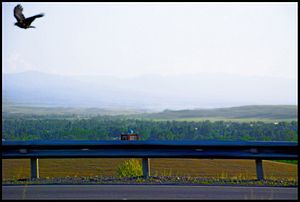Last week, as a fresh slowdown clogged the Kazakh-Kyrgyz border, Kazakh prosecutors asked an Almaty court to convict Damirbek Asylbek-Uulu, a former Kyrgyz lawmaker, and 11 other defendants on smuggling charges, calling for prison sentences from seven to 15 years for the individuals on trial. Asylbek-Uulu, at the time a member of the Kyrgyzstan Party’s parliamentary faction, was arrested in February 2018 in an anti-smuggling raid conducted by the Kazakh authorities.
Asylbek-Uulu’s arrest, as Chris Rickleton noted at the time for Eurasianet, came just as tensions that had flared a few months earlier between the two states were calming. Occasional flare-ups of frustration at the border undercut the overarching Eurasian Economic Union (EAEU) narrative as well as booming talk of greater regional cooperation.
Smuggling remains a serious business across the region, no less because of the establishment of the EAEU, with Kazakhstan a founding member and Kyrgyzstan entering the union, which also includes Russia, Belarus, and Armenia, in August 2015. The Kazakh-Kyrgyz border is a critical node for Chinese goods, imported into Kyrgyzstan, to slip into the EAEU space. Kyrgyzstan has long had a booming re-export sector, with a 2010 estimate suggesting that re-exports accounted for more than 13 percent of GDP, and that was after a dramatic decline triggered by the 2008 global financial crisis. With Kyrgyzstan’s entry into the EAEU’s customs union, the Kyrgyz leadership hoped to steer the country’s economic base from re-export to production — but smuggling provides an alternative.
It also provides fodder for times when the Kazakh-Kyrgyz relationship tips toward tension.
In early October 2017, as Kyrgyzstan hurtled toward a presidential election, the outgoing president, Almazbek Atambayev, went on a tirade against Kazakhstan. The spark for his anger was a visit to Almaty by presidential candidate Omurbek Babanov, the chief opponent to Atambayev’s pick, Sooronbay Jeenbekov. Babanov even met with then-Kazakh President Nursultan Nazarbayev. Atambayev, and by default the Kyrgyz government, accused Kazakhstan of meddling in their election. I wrote at the time, “Astana [as the capital of Kazakhstan was then called] seemed to have had enough and the border became mired in the quicksand pouring from Atambayev’s mouth.”
Trucks stuck in detailed border checks with beds of rotting produce lined the Kyrgyz side of the border. Kazakh authorities cited infected fruit and smuggling concerns. The Kyrgyz went as far as to notify the WTO, though they did not file a formal complaint. While the storm eventually blew over, the contributing factors remain in play.
Last February, the Kazakh authorities announced that 29 people had been arrested along the Kyrgyz border in raids targeting smugglers. Among the arrested were customs officials, criminals, and four Kyrgyz citizens, including parliamentary deputy Asylbek-Uulu. In subsequent months it came out that he also held Kazakh citizenship, which led to his expulsion in April 2018 from the Kyrgyz parliament (given laws preventing dual citizens from serving in public office). Kazakhstan in December 2018 revoked his citizenship, under laws preventing dual citizenship — his trial, which began in October 2018, was as a Kyrgyz citizen.
As Asylbek-Uulu’s trial creeps toward a conclusion, there have been fresh difficulties at the Kazakh-Kyrgyz border. On April 3, the Kyrgyz Economy Ministry accused Kazakhstan of violating the EAEU’s terms with the stoppage of Kyrgyz trucks for additional checks. “The move is a hidden customs control that absolutely contradicts [Eurasian Economic Union] regulations,” the ministry said in a statement.
There’s not necessarily a linkage between the Asylbek-Uulu case and the slowdown at the border beyond the optics and the overarching conclusion that the Kazakh-Kyrgyz border, despite both states being in the EAEU, remains subject to friction. These points also take some of the shine off high-flying statements about regional cooperation and point to the concrete areas the states of Central Asia will need to address to achieve dreams of greater intra-regional trade.

































